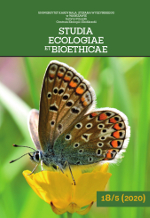Soil nematodes in the field and fallow - density and diversity
Soil nematodes in the field and fallow - density and diversity
Author(s): Krassimira Ilieva-Makulec, Renata Franczak, Grzegorz MakulecSubject(s): Agriculture, Energy and Environmental Studies
Published by: Wydawnictwo Naukowe Uniwersytetu Kardynała Stefana Wyszyńskiego w Warszawie
Keywords: soil nematodes;arable field;fallow;biocenotic indices;bioindication
Summary/Abstract: The results presented here concern the study, which was carried out in the spring of 2009 on an arable field and a fallow. Following parameters were analysed: density, taxonomic composition, trophic and dominance structure of soil nematode communities. Shannon-Weaver diversity index, Sørensen’s index of similarity and Maturity index were also calculated. The results show that the nematode community in the soil of arable field differed from that on the fallow in respect of density and trophic structure. Nematode density was higher in the arable soil than in the fallow. The group of bacterial-feeding nematodes was the most numerous among five trophic groups recorded in the study. The higher density of that group in the arable soil than in the fallow indicates the positive response of bacterial-feeding nematodes to the higher nutrient supply after the manure applying. The results show that in three years of fallow nematode communities became more mature and diverse than in the arable soil. The study confirms the indicative value of some nematode community parameters and indices for the assessment of the varying human intervention on the functional state of the soil.
Journal: Studia Ecologiae et Bioethicae
- Issue Year: 18/2020
- Issue No: 5
- Page Range: 303-315
- Page Count: 13
- Language: English

